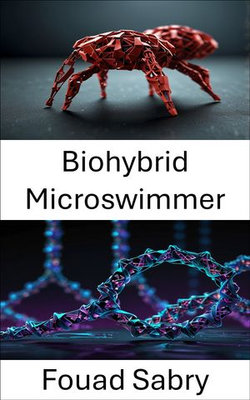Biohybrid microswimmer-This chapter introduces the concept of biohybrids and their significance in combining biological systems with robotic components, highlighting their potential for innovative applications in medicine and technology
Microswimmer-A detailed exploration of the mechanics of microswimmers, smallscale robots designed to navigate fluid environments, and their potential in targeted drug delivery and environmental monitoring
Molecular motor-Discover the molecular motors that power biohybrids and their importance in mimicking natural biological processes for advanced robotic functions at the nanoscale
Biofilm-This chapter focuses on the role of biofilms in the behavior and development of biohybrids, demonstrating their relevance in creating selfhealing and adaptable systems
Selfpropelled particles-Learn about selfpropelled particles, their mechanisms, and how they can be engineered to move autonomously, a key component of biohybrids in bioengineering
Marine prokaryotes-Dive into the biology of marine prokaryotes, understanding their natural propulsion mechanisms and how they inspire the design of biohybrid microswimmers
Nanomotor-This chapter explores the intricacies of nanomotors, their design, and their integration into biohybrids to enhance efficiency and performance at a microscopic scale
Quorum sensing-A detailed discussion on quorum sensing, a communication system in bacteria, and how it influences the coordination of biohybrid microswimmers for more effective collaborative actions
Nanorobotics-Explore the broader field of nanorobotics, providing context for biohybrids as part of the larger revolution in smallscale robots capable of performing complex tasks
Bacterial motility-This chapter examines how bacteria move and interact with their environments, offering insights into how biohybrids can mimic these behaviors to navigate within complex environments
Runandtumble motion-Delve into the runandtumble mechanism, an essential concept in the movement of microorganisms, and how biohybrids can replicate this to achieve efficient locomotion
Bacteria-Understand the biology of bacteria, their propulsion systems, and the vital role they play in the design of biohybrids that can navigate and operate in challenging environments
Flagellum-This chapter provides an indepth look at flagella, the biological motors that drive bacterial movement, and how these principles are applied in biohybrid microswimmers for movement and functionality
Chemotaxis-Learn about chemotaxis, the process by which organisms move toward or away from chemical stimuli, and its integration into biohybrids to guide their movement in complex environments
Siderophore-Discover the role of siderophores in biological systems and their significance in biohybrid applications for targeted delivery and navigation
Metin Sitti-A focus on Metin Sitti's pioneering work in biohybrid systems and the development of biohybrids that bridge the gap between biology and robotics, setting the stage for future innovations
Microbotics-Learn about microbotics, a field that focuses on the design and development of miniature robots, and their connection to biohybrids in advancing applications in medicine and environmental protection
Microorganism-Gain a deeper understanding of microorganisms and how their biological processes inspire the design of biohybrids that can operate in realworld environments
Protist locomotion-This chapter examines the movement of protists, unicellular organisms that offer valuable lessons in how to engineer biohybrids for diverse environments
Gliding motility-Explore the unique mechanisms of gliding motility in certain organisms, providing valuable insights for the creation of biohybrid systems that can navigate smoothly across various surfaces



Share This eBook: